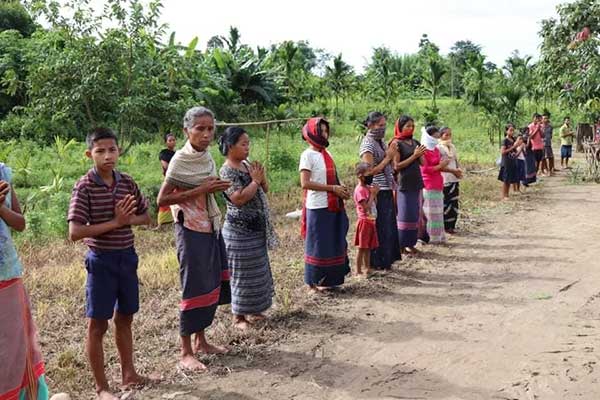The Chakma Development Foundation of India (CDFI) on Wednesday urged Arunachal Pradesh Chief Minister Pema Khandu not to perpetuate prejudices against the Chakmas and Hajongs by terming them as refugees, who are not eligible for permanent settlement in the state and therefore, proposing their relocation to other states of India.
The CDFI said that while addressing a training programme commemorating the national Panchayati Raj Day in Itanagar earlier this week, Khandu had declared that after resolving the Assam-Arunachal boundary dispute, he would resolve the Chakma and Hajong issue by sending them to other states as these tribals being refugees cannot be permanently settled in the state, which is protected as a tribal state under the Constitution.
"The Chakmas and Hajongs were settled by the Union of India, the competent authority of the then North Eastern Frontier Agency (NEFA), from 1964 onwards and those born in the NEFA/Arunachal Pradesh are citizens of India by birth.
"There is no provision in the Constitution empowering any state or UT to declare us as non-resident and therefore forcibly remove us from our territorial jurisdiction," CDFI founder Suhas Chakma said.
He said that most of those who had migrated during 1964-1969 are dead now, and those who are alive cannot be removed from the state as per the directions of the Supreme Court in its 1996 judgment in the NHRC vs State of Arunachal Pradesh case.
"There is also no provision in the Constitution defining Arunachal Pradesh or any other state as a tribal state, and in fact, Article 371(h) of the Constitution only gives special responsibility and powers to the Governor of Arunachal Pradesh.
"Therefore, the statements such as Chakmas and Hajongs are refugees, Arunachal Pradesh is a tribal state protected by the Constitution etc. are incorrect and only perpetuate the prejudices against a section of the Indian citizens," Suhas Chakma said in the statement.
He also cautioned the state government by saying, "If Arunachal Pradesh expects other states to take in a few thousand Chakmas and Hajongs, there would be call upon Arunachal to share the burden of 1.9 million people excluded from the NRC in Assam and other states like Tripura, considering that the density of population in 2022 was 17 persons per sq km in Arunachal Pradesh compared to the national average of 431 people per sq km.
Also, considering the claim of China on Arunachal Pradesh, including renaming of the Indian territories, along with the extremely low population density in the state, the demand for settlement of people from other parts of India to Arunachal Pradesh to counter the threats of China may arise in the near future, the statement said.
"After all, many groups, including ex-Assam Rifles, refugees from erstwhile East Pakistan etc. were settled in the then NEFA to address the security threat from China following the 1962 Indo-China war," it added.
In his address, Chief Minister Khandu had also stated that whenever he visits eastern Arunachal and meets the Chakmas, he feels extremely sad to see that they have no facilities, the housing conditions are bad and there are so many poor Chakmas, the CDFI said.
Suhas Chakma said that the Chief Minister must realise that the deplorable economic condition and extreme poverty have been created by the state of Arunachal Pradesh by denying all the rights and facilities to the Chakmas and Hajongs for the last 60 years.
"Mere expression of sadness is not enough, the Chief Minister himself must ensure implementation of the sustainable development goals in the Chakma and Hajong-inhabited areas if such extreme poverty is to be alleviated," he added.
There are about 65,000 tribals belonging to Chakma and Hajong communities in Arunachal Pradesh who fled from East Pakistan (now Bangladesh) and were settled by the Central government in the then North East Frontier Agency (NEFA) in 1964 to beef up security following the 1962 Indo-China war.




Manipur Police arrest 11 militants, recover large cache of arms, ammunition
The Manipur Police arrested 11 militants belonging to various banned outfits and recovered a large cache of arms and ammunition during the past 24 hours, officials said here on Friday.
PM Modi unveils 21-point action plan at 6th BIMSTEC Summit
Prime Minister Narendra Modi on Friday presented a comprehensive 21-point action plan during the sixth BIMSTEC Summit in Bangkok, laying out an ambitious road map for cooperation across diverse sectors.
ED raids multiple premises of 'Empuraan' producer Gokulam Gopalan
Amid the controversy surrounding Malayalam film ‘Empuraan’ starring superstar Mohanlal, the Enforcement Directorate (ED) on Friday conducted raids at multiple premises linked to film’s producer Gokulam Gopalan.
SC declines PIL seeking restriction of social media platforms for kids below 13 years
The Supreme Court on Friday refused to entertain a public interest litigation (PIL) seeking urgent judicial intervention to regulate access to social media platforms for children below 13 years of age.
BIMSTEC Summit: PM Modi, Yunus meet amid strained ties
Prime Minister Narendra Modi on Friday held a bilateral meeting with Muhammad Yunus, Chief Advisor of Bangladeshi interim government, on the sidelines of the 6th BIMSTEC Summit in Bangkok.
Rupee strengthens against dollar amid Trump's reciprocal tariffs
The Indian rupee witnessed sharp gains on Friday at below 85 against dollar, as the dollar index and oil prices dropped sharply amid concerns over recession in the US economy after the reciprocal tariffs were announced.
Quad to send $20 million relief support to earthquake-ravaged Myanmar
Quad members Australia, India, Japan, and the United States on Friday collectively committed over $20 million in humanitarian assistance to support the relief efforts for the earthquake-devastated Myanmar.
'Waqf Bill will benefit Muslims, no threat to religious sites,' says Shahabuddin Razvi
Maulana Shahabuddin Razvi, the National President of All India Muslim Jamaat, expressed his support for the Waqf (Amendment) Bill, stating that it would significantly benefit Muslims and ensure the betterment of their socio-economic conditions.